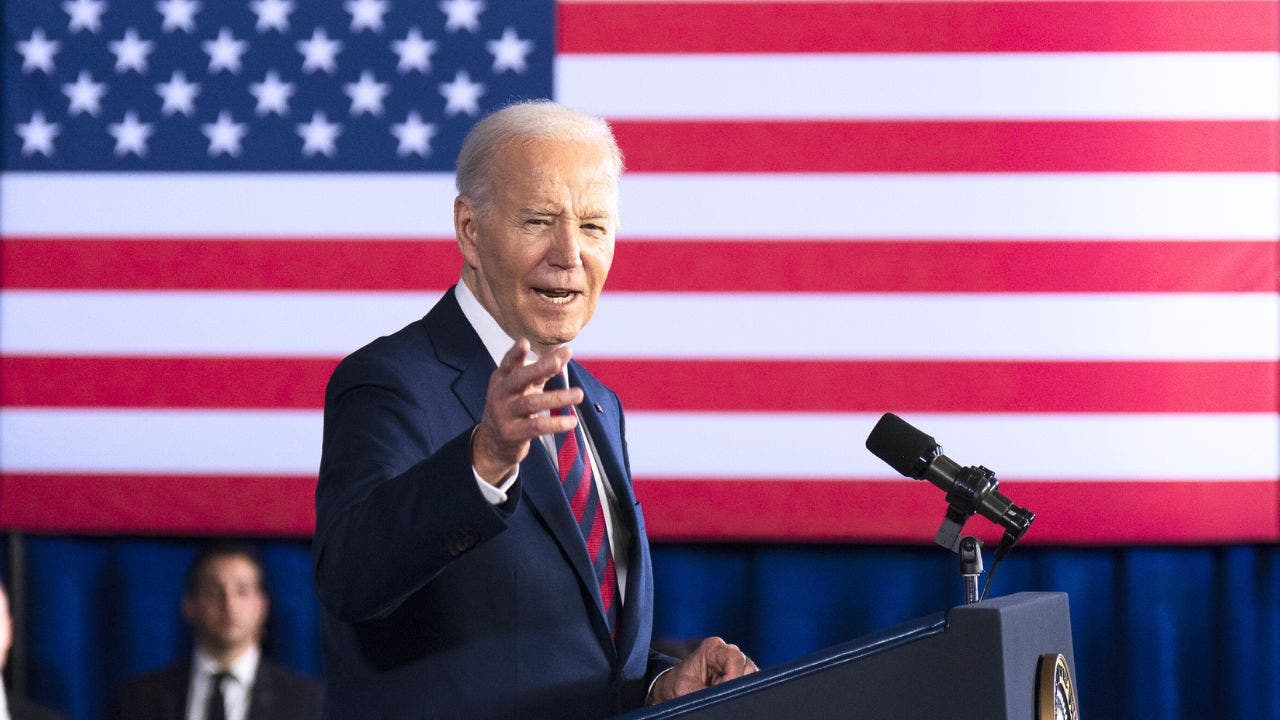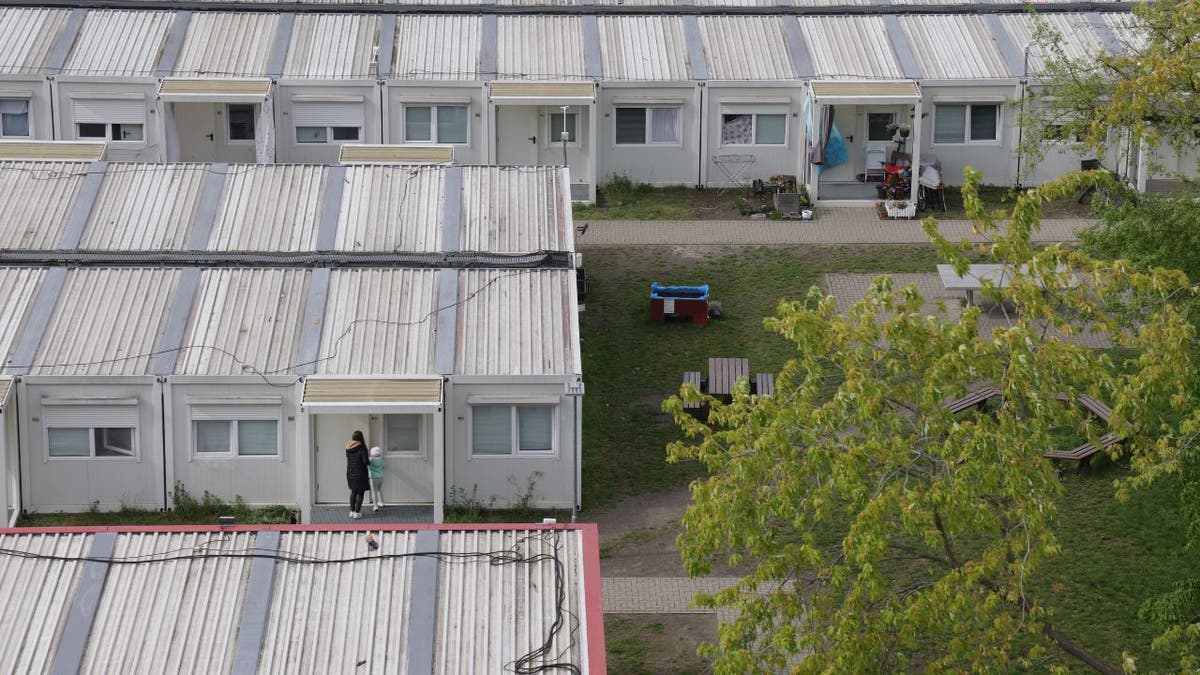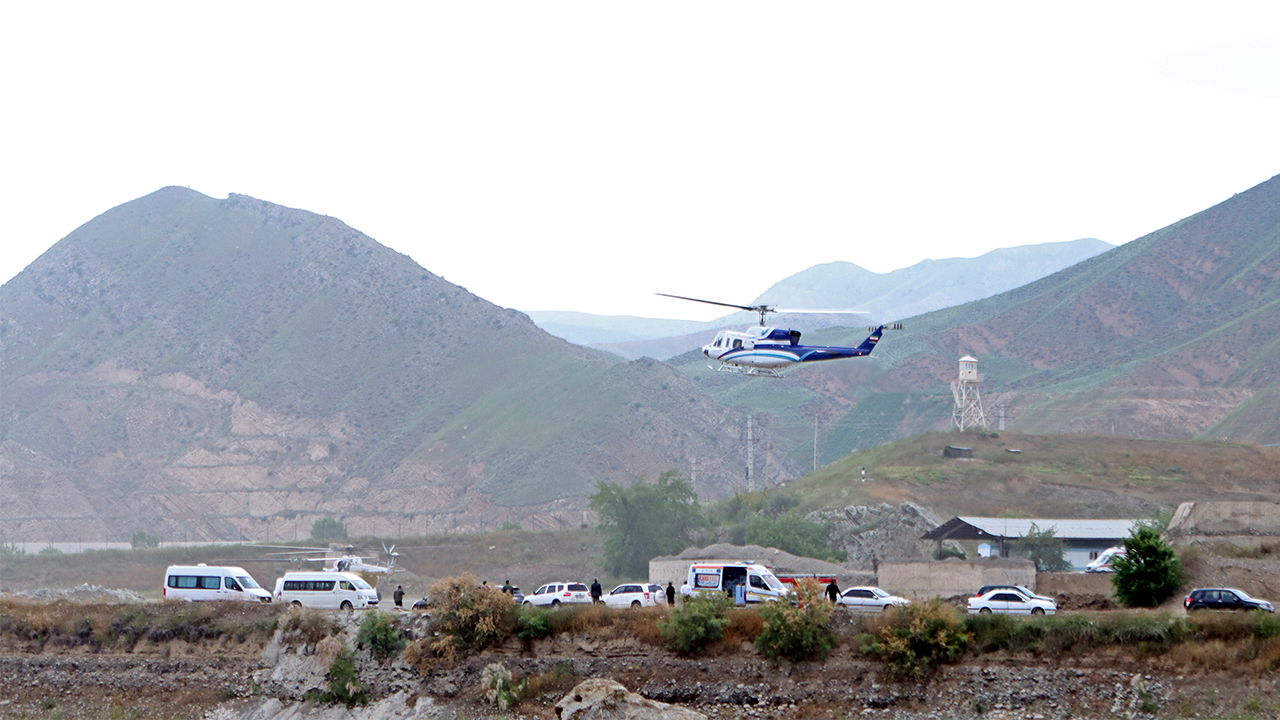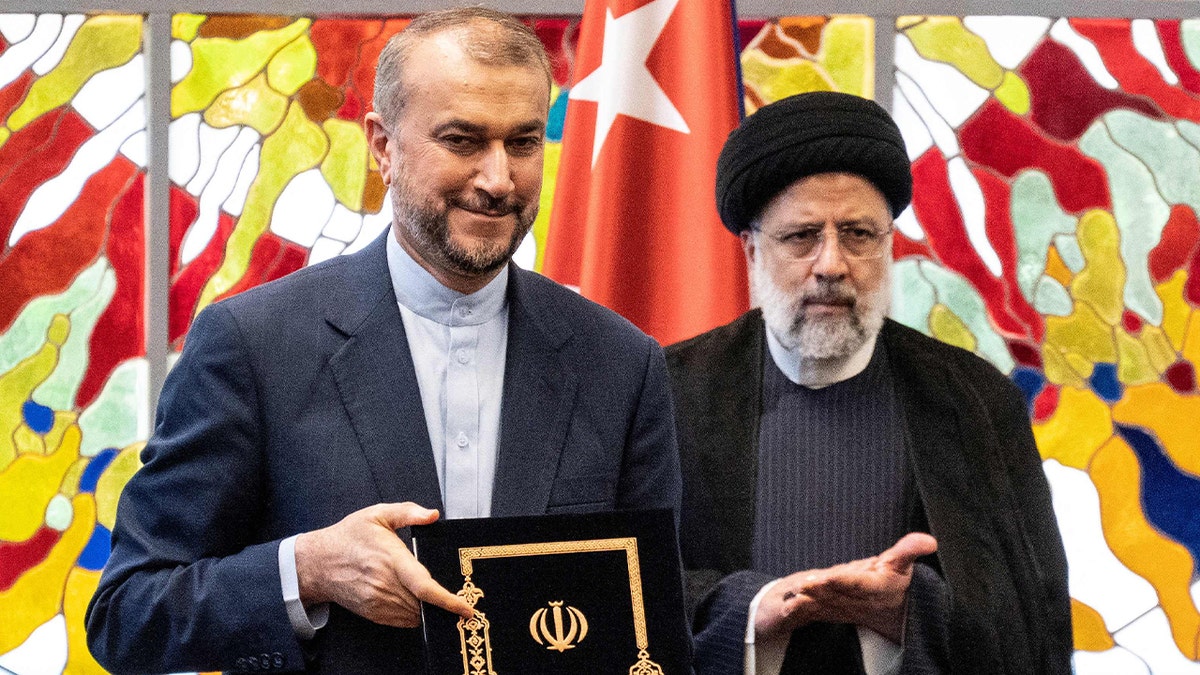World
US reputation declines globally, immigration concerns grow in Europe: study

The reputation of the U.S. globally has taken a hit over the last year and the majority of citizens believe election integrity threatens the country’s democracy, while immigration is now one of the top concerns among Europeans, according to a global study published on Wednesday.
The drop in positive attitudes towards the U.S. is particularly stark in the Muslim-majority countries surveyed, including Indonesia, Malaysia, Turkey, Morocco, Egypt, and Algeria, as well as in European countries such as Switzerland, Ireland, Ukraine and Germany.
Still, the U.S. remains positively viewed globally, although Russia and China are now seen as positively as the U.S. in most Middle East and North African countries surveyed, according to the study.
BIDEN PLAN TO EXTEND OBAMACARE ELIGIBILITY TO ILLEGAL IMMIGRANTS GETS PUSHBACK IN CONGRESS: ‘MADNESS’
Biden speaks at the Pieper-Hillside Boys and Girls Club in Milwaukee, Wisconsin, on March 13, 2024. The reputation of the U.S. has suffered globally between the Spring of 2023 and the Spring of 2024. ( Sara Stathas/Bloomberg via Getty Images)
In Europe, countries have witnessed a sharp increase in the share of people who say that “reducing immigration” should be a top government priority as concerns about climate change fall, according to a global study published on Wednesday. About 5.1 million immigrants entered the EU from non-EU countries in 2022, an increase of around 117%, or 2.7 million, compared to 2021, European data shows.
Germany was in the lead with 44% when it came to people wanting their government to focus on reducing immigration, followed by Ireland and France.
The study, called the Democracy Perception Index (DPI) is one of the world’s largest annual studies on how people perceive the state of democracy in their respective countries and consisted of 63,000 interviews from people across 53 countries. It was conducted by the Denmark-based think tank Alliance of Democracies Foundation and the research group Latana. It did not provide a reason for the U.S. reputation decline.
The DPI found that faith in democracy has remained high across the globe over the past six years with 85% of those polled saying that it’s important to have democracy in their country.
However, governments don’t always live up to people’s expectations. While 58% of respondents were satisfied with the state of democracy in their country, the remainder were not.
In the U.S., 60% of respondents said that unfair elections and/or election fraud threatens the country’s democracy, while about 77% said that corruption is a threat to democracy.
LESS THAN 1 IN 4 AMERICANS HAVE FAVORABLE OPINION OF FEDERAL GOVERNMENT: POLL

A container settlement that provides housing for refugees stands in Kreuzberg district on April 16, 2024 in Berlin, Germany. Immigration is now a major concern among Germans. ( Sean Gallup/Getty Images)
The study said dissatisfaction was not limited to non-democratic countries. It was also prevalent in the U.S., Europe and in other places with a long democratic tradition.
In Europe, about a third of Hungarians believe they live in a democracy.
About half of the people around the world, in both democratic and non-democratic countries, feel that their government is acting only in the interest of a small group of people. Over the past four years, this perception has remained highest in Latin America, lowest in Asia and has steadily increased in Europe since 2020 – particularly in Germany, the study shows.
Israel, Ukraine and Russia have all experienced a “rally around the flag” effect, with the public perception that the government is acting in the interest of the majority of the people increasing rapidly after the start of their respective conflicts. In Ukraine, however, this perception declined sharply after it peaked in 2022.
Anders Fogh Rasmussen, the chair of the Alliance of Democracies Foundation and former Danish Prime Minister, says that these figures are an eye-opener and the trend shows there is a risk of losing the Global South to the autocracies.

The DPI found that faith in democracy has remained high across the globe over the past six years with 85% of those polled saying that it’s important to have democracy in their country. (PAUL J. RICHARDS/AFP via Getty Images)
“Around the world people want to live under democracy but these figures are a wake-up call for all democratic governments,” Rasmussen said.
“Defending democracy means advancing freedom around the world, but it also means listening to voters’ concerns at home… We are witnessing an axis of autocracies forming from China to Russia to Iran. We must act now to make freedom more attractive than dictatorship and unite through an alliance of democracies to push back against the emboldened autocrats.
War and violent conflict is increasingly seen as the most important global challenge, followed by poverty and hunger, and climate change. The last year has seen a global rise in the share of people who say that migration and terrorism are among the world’s largest challenges, particularly among Europeans.
At the national level, most people want their governments to focus more on poverty reduction, corruption and economic growth.
However, there are strong regional differences in priorities: Europeans and Americans are much more likely to want their government to prioritize improving healthcare, fighting climate change and reducing immigration than countries in Asia and Latin America, where fighting corruption and promoting growth are seen as more important.
Globally, 33% of those surveyed believe climate change is one of the world’s three main challenges, but only 14% say fighting it should be among the top three priorities for their government.
Immigration is likely to play a major role in next month’s European elections where nationalist parties are expected to make significant gains.
The Associated Press contributed to this report.

World
Iran's president, foreign minister, other officials confirmed dead in helicopter crash

Iran’s President Ebrahim Raisi, Foreign Minister Hossein Amir-Abdollahian and other officials were confirmed dead on Monday after their helicopter crashed in a mountainous region of the country’s northwest, Iranian state media reported.
State TV said earlier on Monday that there was “no sign of life” at the crash site of the helicopter that was carrying 63-year-old Raisi, 60-year-old Abdollahian and other officials after it made a “hard landing” on Sunday.
The crash site was across a steep valley, according to state media, which gave no immediate cause for the crash.
As the sun rose on Monday, rescuers saw the helicopter from a distance of roughly 1.25 miles, head of the Iranian Red Crescent Society Pir Hossein Kolivand told state media. The officials had been missing for more than 12 hours when the helicopter was observed.
IRANIAN PRESIDENT EXPERIENCES ‘HARD LANDING’ IN HELICOPTER: IRANIAN MEDIA
There was “no sign of life” reported Monday at the crash site of the helicopter that was carrying Iran’s President Ebrahim Raisi and other officials, according to Iranian state media. (Ali Hamed Haghdoust/IRNA via AP)
Raisi and Amir-Abdollahian were traveling in Iran’s East Azerbaijan province when the helicopter made what state TV described as a “hard landing” near Jolfa, a city on the border with the nation of Azerbaijan, roughly 375 miles northwest of Tehran. State TV later said it crashed further east near the village of Uzi, although details remained contradictory.
The governor of the East Azerbaijan province and other officials and bodyguards were also aboard, according to the state-run IRNA news agency. One local government official described what happened as a “crash,” while others referred to it as a “hard landing” or an “incident.”

Iranian Foreign Minister Hossein Amir-Abdollahian (L) and Iran’s President Ebrahim Raisi (R) attend a bilateral agreement signing in Havana, Cuba, at the Revolution Palace on June 15, 2023. (YAMIL LAGE / AFP)
“The esteemed president and company were on their way back aboard some helicopters and one of the helicopters was forced to make a hard landing due to the bad weather and fog,” Interior Minister Ahmad Vahidi said in comments aired on state TV.
WHAT HAPPENS IN THE EVENT OF RAISI’S DEATH? AN IRAN EXPERT WEIGHS IN

Rescue teams are seen near the crash site of the helicopter carrying Iranian President Ebrahim Raisi in Varzaghan in northwestern Iran. (Azin Haghighi, Moj News Agency via AP)
The incident comes as Iran, under Raisi and Supreme Leader Ayatollah Ali Khamenei, launched an unprecedented drone-and-missile attack against Israel last month.
Iran has also faced years of mass protests against its Shiite theocracy in response to a struggling economy and attacks on women’s rights.
The Associated Press contributed to this report.
World
Fake news on the rise as the European elections draw near

Poland’s Prime Minister Donald Tusk, the shooting of Slovakia’s Prime Minister Robert Fico and new EU anti-money laundering rules have all been the target of misinformation recently.
Ahead of the European elections between 6 and 9 June, EU leaders and the European Union itself are increasingly finding themselves as the targets of misinformation campaigns.
Whether it’s an attempt to discredit political rivals or claims about EU regulations, social media is rife with false narratives.
One such example stems from the dramatic shooting of Slovakia’s Prime Minister Robert Fico, which has prompted swathes of politically-motivated misinformation online.
Social media users are claiming that this picture shows Fico’s alleged attacker alongside Martin Šimečka, the father of the leader of the opposition party Progressive Slovakia.
Slovakian media has identified the alleged shooter as self-described writer Juraj Cintula.
However, the picture in the post doesn’t show Cintula and Šimečka together. In fact, the second man in the picture isn’t Šimečka at all, and the photo itself comes from one of Cintula’s book launches in 2019.
Facebook itself has now labelled the post as false information.
The attempted false association of the attack on Fico with his political rivals remains particularly dangerous ahead of the European elections.
Is Donald Tusk ashamed of his Polish identity?
Across the border in Poland, Prime Minister Donald Tusk has been accused of attacking the notion of Polishness as an identity.
A picture posted on TikTok claims that Tusk called Polishness ‘an abnormality’ that comes to him ‘with painful persistence’. However, this is misleading.
The prime minister did state those words, but they come from an article he wrote over 40 years ago.
According to Polish fact-checkers, Tusk’s article critically discusses Poles’ attitudes to reality before confirming that he identifies with his own Polishness, at a time when Poland was a communist satellite of the Soviet Union.
“Despite its oppressive heritage it remains our common conscious choice,” he said.
As a strongly pro-EU prime minister who previously served as president of the European Council, Tusk is a crucial target for misinformation mere weeks before the elections.
Is the EU banning cash payments of over €100,000?
Often, it’s the EU itself that’s under attack from those spreading false narratives.
Some social media users say the bloc has prohibited all cash payments over €100,000.
This is partly true: the EU has approved rules limiting cash transactions to €100,000 as part of a raft of new anti-money laundering measures, but these restrictions don’t apply to all transactions.
Specifically, there’s a limit on professional traders barring them from accepting or paying cash over €100,000.
Transfers between private individuals in a non-professional context are excluded.
Ahead of the European elections, it’s critical that news is shared accurately and fairly, so that the electorate can vote with the proper information at hand.
World
Despite polls, Biden aides insist Gaza campus protests will not hurt reelection bid

-

 News1 week ago
News1 week agoSkeletal remains found almost 40 years ago identified as woman who disappeared in 1968
-

 World1 week ago
World1 week agoIndia Lok Sabha election 2024 Phase 4: Who votes and what’s at stake?
-

 Politics1 week ago
Politics1 week agoTales from the trail: The blue states Trump eyes to turn red in November
-

 World1 week ago
World1 week agoBorrell: Spain, Ireland and others could recognise Palestine on 21 May
-

 World1 week ago
World1 week agoCatalans vote in crucial regional election for the separatist movement
-

 Politics1 week ago
Politics1 week agoNorth Dakota gov, former presidential candidate Doug Burgum front and center at Trump New Jersey rally
-

 Movie Reviews1 week ago
Movie Reviews1 week ago“Kingdom of the Planet of the Apes”: Disney's New Kingdom is Far From Magical (Movie Review)
-

 World1 week ago
World1 week agoUkraine’s military chief admits ‘difficult situation’ in Kharkiv region












